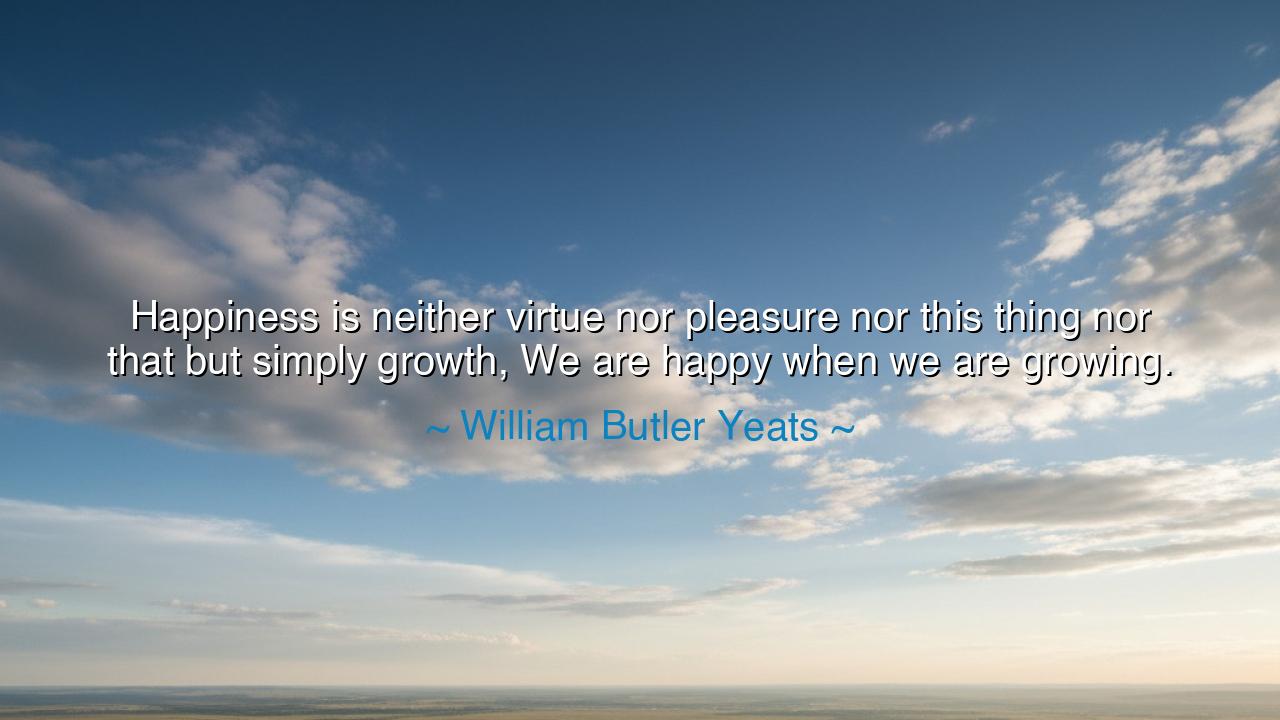
Happiness is neither virtue nor pleasure nor this thing nor that
Happiness is neither virtue nor pleasure nor this thing nor that but simply growth, We are happy when we are growing.






William Butler Yeats, the poet-seer of Ireland, once wrote with quiet revelation: “Happiness is neither virtue nor pleasure nor this thing nor that but simply growth. We are happy when we are growing.” In these words, Yeats pierces through the illusions that have ensnared humankind for ages — the belief that happiness lies in possession, or in fleeting delight, or even in moral pride. He tells us instead that happiness is movement, the steady unfolding of the soul toward its fuller form. For Yeats, life’s truest joy is not in having arrived, but in becoming, not in being perfect, but in being in motion toward perfection.
To understand the origin of this thought, we must remember the man who spoke it. Yeats, born amid the turmoil of Ireland’s awakening, was not merely a poet of beauty but of transformation. His life was a long journey through art, mysticism, politics, and love — a ceaseless striving toward wisdom. He saw that both virtue and pleasure, though noble in their ways, could trap the spirit if they became static. Virtue without growth becomes pride; pleasure without change becomes emptiness. The universe, he understood, is ever expanding — the stars themselves are in flight. How, then, could the human soul find happiness in stillness? We are children of the cosmos; we were made to grow, and only in growing do we fulfill our nature.
Happiness, in this view, is not a reward, but a rhythm — the rhythm of progress, of stretching beyond yesterday’s self. The flower that blooms, the artist who creates, the thinker who questions — all partake in the same sacred motion. The river does not stop to rest, nor does the tree cease to reach for light. And when they grow, they are at peace with what they are. So too with man: stagnation is his sorrow, growth his gladness. The one who keeps learning, who keeps striving, who dares to evolve even amid failure, is the one who walks the path of joy.
History offers many witnesses to this truth. Consider Nelson Mandela, who spent twenty-seven years in prison, yet emerged not hardened but transformed — a man of wisdom, patience, and vision. His happiness was not the happiness of comfort or indulgence, but of growth through suffering. Within those years of captivity, he did not decay; he deepened. He forgave, he understood, he rose. When he said, “I am not a saint, unless you think of a saint as a sinner who keeps on trying,” he spoke the same language as Yeats. For both men knew that happiness is not found in the ease of life, but in the evolution of the spirit.
Even the ancients knew this. Aristotle wrote that all living things have within them a purpose, an inner drive toward their own perfection — the acorn toward the oak, the child toward wisdom. Yeats echoes this eternal insight in poetic form. To him, growth is the law of the soul, the music that underlies existence itself. When man resists it — when he clings to comfort or certainty — he grows bitter, restless, and weary. But when he embraces it — when he accepts that life is a process of continuous transformation — he finds peace even in struggle. Growth does not always feel like joy, but it becomes joy, for it gives meaning to every trial and victory alike.
Virtue and pleasure, though beautiful, are incomplete without this deeper current. Virtue without growth becomes rigid dogma; pleasure without growth becomes fleeting indulgence. Only growth contains both — it refines virtue and enriches pleasure. The artist who hones his craft, the parent who learns patience, the lover who matures through understanding — all are nourished by this divine process. They are not seeking happiness as an end, yet they find it along the way, because every step forward is a song of becoming.
So, my listener, take Yeats’ wisdom as a mirror for your own journey. Do not measure happiness by comfort or achievement, for these are but milestones. Measure it by growth — by the widening of your compassion, the deepening of your understanding, the strengthening of your soul. When you fail, let that failure teach you. When you succeed, let that success inspire further striving. Keep moving, keep learning, keep unfolding. For the moment you cease to grow, your spirit begins to fade. But as long as you rise — even if only by an inch, even if through pain — you will know the quiet, steadfast joy that Yeats called true happiness, the joy of a soul that continues to become what it was meant to be.






AAdministratorAdministrator
Welcome, honored guests. Please leave a comment, we will respond soon